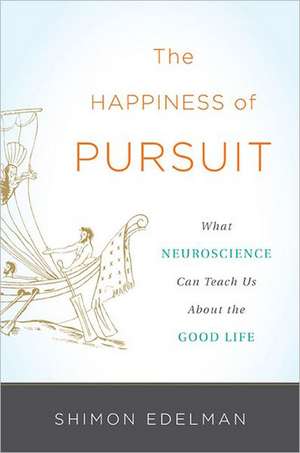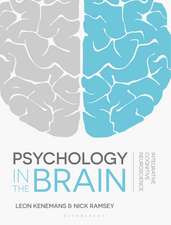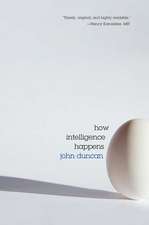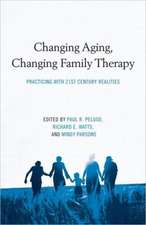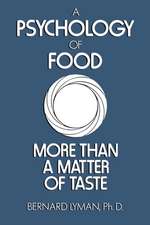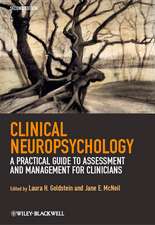The Happiness of Pursuit: What Neuroscience Can Teach Us About the Good Life
Autor Shimon Edelmanen Limba Engleză Hardback – 30 ian 2012 – vârsta de la 13 ani
When
fishing
for
happiness,
catch
and
release.
Remember
these
seven
words—they
are
the
keys
to
being
happy.
So
says
Shimon
Edelman,
an
expert
on
psychology
and
the
mind.
InThe
Happiness
of
Pursuit,
Edelman
offers
a
fundamental
understanding
of
pleasure
and
joy
via
the
brain.
Using
the
concept
of
the
mind
as
a
computing
device,
he
unpacks
how
the
human
brain
is
highly
active,
involved
in
patterned
networks,
and
constantly
learning
from
experience.
As
our
brains
predict
the
future
through
pursuit
of
experience,
we
are
rewarded
both
in
real
time
and
in
the
long
run.
Essentially,
as
Edelman
discovers,
it's
the
journey,
rather
than
the
destination,
that
matters.
The idea that cognition is computation—the brain is a machine—is nothing new of course. But, as Edelman argues, the mind is actually a bundle of ongoing computations, essentially, the brain being one of many possible substrates that can support them. Edelman makes the case for these claims by constructing a conceptual toolbox that offers readers a glimpse of the computations underlying the mind's faculties: perception, motivation and emotions, action, memory, thinking, social cognition, learning and language. It is this collection of tools that enables us to discover how and why happiness happens.
An informative, accessible, and witty tour of the mind,The Happiness of Pursuitoffers insights to a thorough understanding of what minds are, how they relate to each other and to the world, and how we can make the best of it all.
The idea that cognition is computation—the brain is a machine—is nothing new of course. But, as Edelman argues, the mind is actually a bundle of ongoing computations, essentially, the brain being one of many possible substrates that can support them. Edelman makes the case for these claims by constructing a conceptual toolbox that offers readers a glimpse of the computations underlying the mind's faculties: perception, motivation and emotions, action, memory, thinking, social cognition, learning and language. It is this collection of tools that enables us to discover how and why happiness happens.
An informative, accessible, and witty tour of the mind,The Happiness of Pursuitoffers insights to a thorough understanding of what minds are, how they relate to each other and to the world, and how we can make the best of it all.
Preț: 211.66 lei
Nou
Puncte Express: 317
Preț estimativ în valută:
40.51€ • 44.02$ • 34.05£
40.51€ • 44.02$ • 34.05£
Carte disponibilă
Livrare economică 31 martie-14 aprilie
Preluare comenzi: 021 569.72.76
Specificații
ISBN-13: 9780465022243
ISBN-10: 0465022243
Pagini: 256
Dimensiuni: 149 x 216 x 22 mm
Greutate: 0.36 kg
Ediția:New.
Editura: BASIC BOOKS
Colecția Basic Books
ISBN-10: 0465022243
Pagini: 256
Dimensiuni: 149 x 216 x 22 mm
Greutate: 0.36 kg
Ediția:New.
Editura: BASIC BOOKS
Colecția Basic Books
Notă biografică
Shimon
Edelmanis
Professor
of
Psychology
at
Cornell
University.
He
has
taught
at
universities
in
Israel,
England,
the
United
States,
and
South
Korea.
He
is
the
author
ofComputing
the
MindandRepresentation
and
Recognition
in
Vision,
along
with
dozens
of
scholarly
publications
in
theoretical
neuroscience,
cognitive
psychology,
and
artificial
intelligence,
all
focusing
on
reverse-engineering
the
human
brain.
He
lives
in
Ithaca,
New
York.
Recenzii
New
Scientist
“The Happiness of Pursuitis for fans of enquiries into the nature of the brain, mind—and happiness itself.... [Edelman] offers a happy addition to the classic recipe of ‘self-knowledge, self-improvement, and, eventually, selfless conduct'—a coherent notion of the self.”
The Winnipeg Free Press(Canada)
“Edelman's explanations of just how the mind works...are dense but fascinating.... Without resorting to empty enthusiasm he demonstrates just what a marvel the mind is. He is especially good at explaining how facial recognition works (‘analogy rules all') and how babies learn language (‘language is also a game that plays people').”
Toronto Star(Canada)
“The Cornell University psychology professor demonstrates that the more we understand how the brain operates the better we will understand how our minds process information, knowledge that will make us happy – at least momentarily. We are strivers, forever moving to the next challenge, and that's the key. Edelman's traipses through all fields of human endeavour."
Post and Courier
“[Edelman] paints a picture about how new knowledge of our brains can inform our ability to achieve happiness.... [He] weaves together his scientific expertise about our knowledge of how the brain works with references to Ulysses, Walt Whitman's poetry and Edelman's own passion for the Southwest desert.”
The Guardian(UK)
“[A] cultured and often witty account of brain science and our potential for feeling good. The conclusion is that happiness is to be found in the journey (learning, etc) rather than the destination, at which proverbial advice we arrive after many interesting facts and provocative thoughts on evolution, language, the self and decision-making.”
Greater Good
“An owner's manual for the mind ... an entertaining one.”
Book News
“[An] accessible volume on the science of the brain and mind.... Drawing on hard science, literature, and observations of the human condition, the work presents a readable narrative covering both physical and psychological aspects of happiness.”
Dan Lloyd, Brownell Professor of Philosophy, Trinity College
“The ancient injunction to ‘Know thyself' gets a lively update in Shimon Edelman's eclectic examination of ‘knowing' and ‘self' through the lens of twenty-first century cognitive science. It's human to wander thoughtfully through real and imaginary landscapes, learning as we go—this is happiness, embodied in Edelman's witty odyssey, which provokes the very pleasures it describes.”
Nature
“Taking passages by luminaries including Homer, William Shakespeare and Jorge Luis Borges as touchstones, Edelman powers along on his ‘quest for an algorithmic understanding of happiness', revealing that it is this computational journey that constitutes the good life.”
Salon
“From Bayes' theorem of probability to Shakespeare's ‘Romeo and Juliet,' Edelman offers a range of references and allegories to explain why a changing, growing self, constantly shaped by new experiences, is happier than the satisfaction any end goal can give us. It turns out the rewards we get for learning and understanding the workings of the world really make it the journey, not the destination, that matters most.”
“The Happiness of Pursuitis for fans of enquiries into the nature of the brain, mind—and happiness itself.... [Edelman] offers a happy addition to the classic recipe of ‘self-knowledge, self-improvement, and, eventually, selfless conduct'—a coherent notion of the self.”
The Winnipeg Free Press(Canada)
“Edelman's explanations of just how the mind works...are dense but fascinating.... Without resorting to empty enthusiasm he demonstrates just what a marvel the mind is. He is especially good at explaining how facial recognition works (‘analogy rules all') and how babies learn language (‘language is also a game that plays people').”
Toronto Star(Canada)
“The Cornell University psychology professor demonstrates that the more we understand how the brain operates the better we will understand how our minds process information, knowledge that will make us happy – at least momentarily. We are strivers, forever moving to the next challenge, and that's the key. Edelman's traipses through all fields of human endeavour."
Post and Courier
“[Edelman] paints a picture about how new knowledge of our brains can inform our ability to achieve happiness.... [He] weaves together his scientific expertise about our knowledge of how the brain works with references to Ulysses, Walt Whitman's poetry and Edelman's own passion for the Southwest desert.”
The Guardian(UK)
“[A] cultured and often witty account of brain science and our potential for feeling good. The conclusion is that happiness is to be found in the journey (learning, etc) rather than the destination, at which proverbial advice we arrive after many interesting facts and provocative thoughts on evolution, language, the self and decision-making.”
Greater Good
“An owner's manual for the mind ... an entertaining one.”
Book News
“[An] accessible volume on the science of the brain and mind.... Drawing on hard science, literature, and observations of the human condition, the work presents a readable narrative covering both physical and psychological aspects of happiness.”
David
Eagleman,
Director,
Laboratory
for
Perception
and
Action,
Baylor
College
of
Medicine,
and
author
ofIncognito:
The
Secret
Lives
of
the
Brain
“Edelman marries his scientific mind with his poetic eye to give us the neuroscience that matters the most: an understanding of our own lives.”
Ben-Ami Scharfstein, Professor Emeritus of Philosophy, Tel-Aviv University, and author ofArt Without Borders: A Philosophical Exploration of Art and Humanity
“For all its seriousness, ambition, and learning, Shimon Edelman'sThe Happiness of Pursuitis an extraordinarily human book. It is ambitious because he bases his view of the nature of happiness on what for many of his readers will be an unusual conception of the relation between the brain, the Self, and the body. Happiness, says Edelman, is not simply a state of mind one tries to attain, but an unceasing activity. That is, whenever it does attain its goal, after a pause for savoring its success it must change its goal for a new one.The Happiness of Pursuitshows Edeman to be a witty, resourceful, raconteur. You never forget his presence. He leans out of his book as if he were at an open window beckoning to us to come inside and listen.”
“Edelman marries his scientific mind with his poetic eye to give us the neuroscience that matters the most: an understanding of our own lives.”
Ben-Ami Scharfstein, Professor Emeritus of Philosophy, Tel-Aviv University, and author ofArt Without Borders: A Philosophical Exploration of Art and Humanity
“For all its seriousness, ambition, and learning, Shimon Edelman'sThe Happiness of Pursuitis an extraordinarily human book. It is ambitious because he bases his view of the nature of happiness on what for many of his readers will be an unusual conception of the relation between the brain, the Self, and the body. Happiness, says Edelman, is not simply a state of mind one tries to attain, but an unceasing activity. That is, whenever it does attain its goal, after a pause for savoring its success it must change its goal for a new one.The Happiness of Pursuitshows Edeman to be a witty, resourceful, raconteur. You never forget his presence. He leans out of his book as if he were at an open window beckoning to us to come inside and listen.”
Dan Lloyd, Brownell Professor of Philosophy, Trinity College
“The ancient injunction to ‘Know thyself' gets a lively update in Shimon Edelman's eclectic examination of ‘knowing' and ‘self' through the lens of twenty-first century cognitive science. It's human to wander thoughtfully through real and imaginary landscapes, learning as we go—this is happiness, embodied in Edelman's witty odyssey, which provokes the very pleasures it describes.”
Nature
“Taking passages by luminaries including Homer, William Shakespeare and Jorge Luis Borges as touchstones, Edelman powers along on his ‘quest for an algorithmic understanding of happiness', revealing that it is this computational journey that constitutes the good life.”
Salon
“From Bayes' theorem of probability to Shakespeare's ‘Romeo and Juliet,' Edelman offers a range of references and allegories to explain why a changing, growing self, constantly shaped by new experiences, is happier than the satisfaction any end goal can give us. It turns out the rewards we get for learning and understanding the workings of the world really make it the journey, not the destination, that matters most.”
